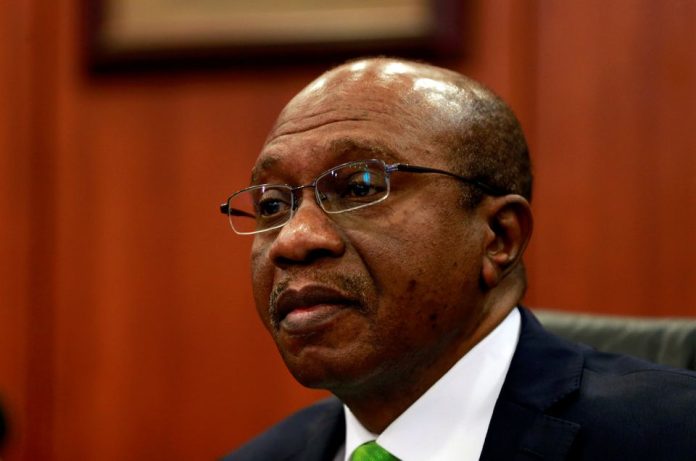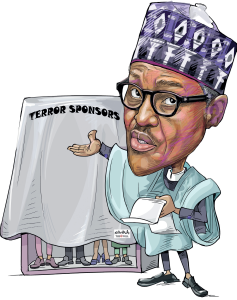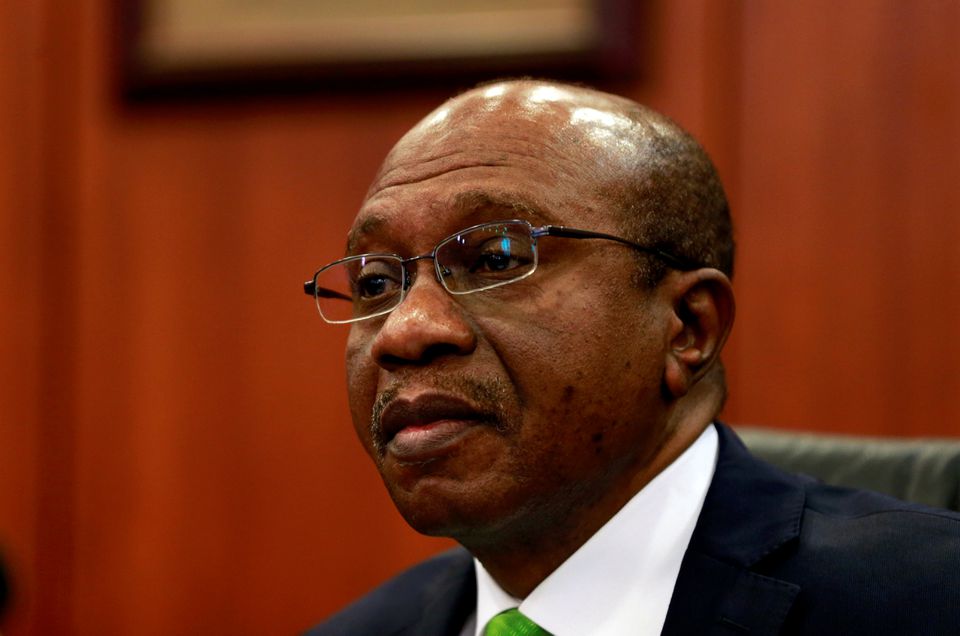Nigeria's Central Bank Governor Godwin Emefiele briefis the media during the MPC meeting in Abuja, Nigeria January 24, 2020. REUTERS/Afolabi


August 07, (THEWILL) – The Governor of the Central Bank of Nigeria (CBN), Mr Godwin Emefiele, has been in the eye of the storm over the worsening depreciation of the naira. The local currency, which has been on a tumbling steep over time, recently crashed to an all-time low of over N700/US$1 in the parallel market. It plunged to N420/US$1 in the I&E window. This reflects a 288 percent and 154.5 percent depreciation compared to the exchange rate of N180/US$1 and N165/US$ in the respective windows before the inauguration of President Muhammadu Buhari in May 2015.
The crash in naira has its fallouts. It triggers a rise in inflation rate (now 18.6 percent in June 2022 against 8.06 percent in 2014), job losses and closure of businesses, high unemployment rate (now 33.3 percent from 4.56 percent in 2014) and generally low standard of living (misery index point of 11 in 2014 compared to 27.5 in 2014). It also calls for increase in taxes, challenges in accessing social services and more pressure on the local currency.
This does not constitute a soothing balm on the citizens who bear the pains. Instead, it has triggered fiery darts against Emefiele from many quarters. Those who believe that the CBN governor bears the blame for the failing Naira and for not producing or supplying the dollar in abundance continue to bicker. Among them are the Nigerian lawmakers.


The Senate of the National Assembly on July 28 passed a resolution to invite the Governor of the Central Bank of Nigeria (CBN), Godwin Emefiele, to account for the unrestrained depreciation of the Naira to the dollar in the foreign exchange market. The Naira had that morning exchanged for over N700 to a dollar in the parallel markets – a trend that began earlier in the week.
The Senate, in the resolution on a motion on ‘the state of CBN Intervention funds and the free fall of the naira’, directed the Committee on Banking, Insurance and Other Financial Institutions to investigate the effect of CBN intervention funds to support critical sectors of the economy. Senator Olubunmi Adetunmbi sponsoring the motion expressed the need for extraordinary measures to address the crisis of the Nigerian economy.
Another ‘patriotic’ move came from the National Youth Council of Nigeria (NYCN) which blamed the Governor of the CBN Governor, Godwin Emefiele, for the rapid depreciation of the Naira. The group in a statement on Sunday July 31, 2022 signed by its President, Comrade Solomon Adodo, attributed the recent free-fall of the Naira to Emefiele’s poor leadership and the apex regulatory bank’s wrong economic management policies which it said the CBN governor spear-headed.
According to Adodo, with inflation at about 19 percent and the exchange rate nearing N800 to a dollar, the CBN governor should be held responsible for “deepening poverty in the country as he continues to work at cross-purposes” with President Buhari’s objectives of reducing poverty and growing the economy.
The same weekend, operatives of the Economic and Financial Crimes Commission (EFCC) raided the Wuse Zone 4 Bureau De Change (BDC) hub of Abuja “over the falling naira”, apparently looking for sacks of dollars dumped in the closets of the BDC operators within the premises.
Beside these ‘patriotic’ angry Nigerians, there are also the ebullient intellectual class which believes that “Emefiele is not doing enough to stem the fall of the Naira”. Punching with fists of fury, the pundits would advance numerous economic theories that the apex bank boss ought to consider to stem the slide of the Naira. Like the others groups, these egg heads firmly agree that Emefiele is responsible for Nigeria’s forex crisis and the attendant depreciation of the local currency. He must “do something” about it.
Ancient Landmark
Irrespective of Emefiele’s perceived faults, negative body language and failing to “focus on his job”, the fundamental truth is that foreign exchange, as a commodity, is earned. It is the result of hard work, innovation, creativity and diligence that create wealth. Foreign exchange is wealth that comes from doing something – adding value. In simple terms, you must have the capacity to produce goods and services that can be exported.
Foreign exchange comes from exports. It also comes from the sale of bonds, treasury bills and other governmental securities whose proceeds flow into the country’s reserves if the investors have confidence in the beneficiary country. Foreign exchange reserves are also built from the proceeds of foreign investments as well as diaspora citizens’ home remittances. Whatever the source, the fundamental principle is that foreign exchange is a function of domestic wealth-creation. It is linked to the health of the foreign reserves. This is an ancient landmark that cannot be adjusted.
Emefiele’s Nigeria
Instead, Nigeria is a chronic import-dependent and consumption nation. It consumes far more than it earns and its domestic capacity to produce is hampered by decrepit infrastructure, lack of electricity supply, high cost of energy, poor road network, insecurity, high production cost and multiple taxes. Nigeria is akin to a farmer who plants sparingly but aims to reap bountifully. Wealthy nations are export-oriented economies like the G-7 nations.
Most advanced economies have foreign exchange reserves in excess of $500 billion and GDP in excess of $3 trillion. They have low inflation rates in the lowest single-digit numbers. Their policy rates average 1 percent; some record 0.00 percent. Nigeria’s foreign reserves is about $36 billion, GDP growth is 3.11 percent with real value of $445 billion. Japan, for instance, is a wealth-creating nation. Its reserved assets totaled $1.38 trillion as of February 28, 2022.
South Africa’s foreign reserves is over $60 billion; its real GDP value is over N300 billion. It generates over 50,000 megawatts of electricity for its 60 million population. Nigeria generates less than 5,000 megawatts of electricity for its over 200 million people. It lacks industrial base and exports virtually nothing except crude oil. Oil revenue accounts for over 95 percent of its foreign exchange earnings and about 80 percent of its budget. Incidentally, it has no control over the price of the commodity in the international markets.
Fiscal policy imbroglio
A simple way to understand what has triggered the current foreign exchange crisis, is by looking at what has happened to Nigeria’s critical source of revenue since the beginning of the year. For five consecutive months, the ‘old’ NNPC made zero remittance to FAAC as at May 2022. This anomaly was as a result of the huge sum of money spent in the payment of petrol subsidy.
According to NNPC which is struggling to generate enough revenue to cover the soaring cost of subsidising the product, the nation has incurred an estimated petrol subsidy of N2.1 trillion in the first six months of this year. This explains the paradox of a failure to benefit from the spike in global oil prices amid supply shortages. It also points to clearly difficult times for a hemorrhaging economy in the grips of stifling fiscal policies.
For instance, the Federal Government which had initially budgeted to spend N443 billion on petrol subsidy between January and June, got the approval of the National Assembly in April to raise the subsidy amount to N4 trillion for the year. The World Bank had in its latest Nigeria Development Update reported that “due to the petrol subsidy and low oil production, Nigeria faces a potential fiscal time bomb.”
This may escalate the 2022 fiscal deficit beyond N10 trillion. With the nation’s debt stock hitting N41.6 trillion as at Q1 2022, there were fears that the nation might be using about 100 percent of its revenue to service debts.
Where we are
Speaking in Abuja at the public consultation to the draft 2023-2025 Medium-Term Fiscal Expenditure/Fiscal Strategy Paper, which officially commenced preparation for the 2023 budget, minister of finance, budget and national planning, Zainab Ahmed, said on Thursday, July 21, that the economy was heading for the worst level.
Ahmed revealed that between January and April 2022, Nigeria’s oil and gas revenue slumped 51 percent to N1.23 trillion compared to budget estimates, as expected benefits from rallying oil prices continues to elude the country due to significant oil production shortfall and petrol subsidy burden. According to Ahmed, for the full-year 2022, oil revenues were projected at N9.37 trillion, but just 39 percent of the projected N3.12 trillion for April-January was realised.
With the N4 trillion provision for fuel subsidy, the government is now projecting to spend N7.35 trillion more than it will earn this year as it makes room for a nine-fold jump in petrol subsidy costs than earlier budgeted. By this, the country will be recording the highest budget deficit in 23 years (since 1999) which amounts to about 5 percent of GDP.
Ahmed confirmed that the high cost of governance and behemoth petrol subsidy are killing the economy. Nigeria’s foreign reserve now stands at below $40 billion. Excess crude account has dropped to $377,000 from over $2 billion in 2014. For the first time, the government disclosed that we now spend more than we earn.
Wither Investment Inflow
Data from various reports show that investment inflow has sharply dwindled culminating into negative status by the first half of 2021.
The first wailing voice was raised by the Nigerian Investment Promotion Commission (NIPC), a government establishment created to encourage, promote and co-ordinate investments in the Nigerian economy. The agency in a report published in July 2021, revealed that investment announcements in Nigeria declined by a whopping 80 percent in the second quarter. According to NIPC, investment inflow fell to $1.69 billion in the second quarter from $8.41bn in the first quarter.
In another report, the National Bureau of Statistics (NBS) revealed that investment into Nigeria slumped to the lowest level in four years as of the first six months of 2021. The statistics bureau in its report entitled ‘Nigerian Capital Importation (Q1 & Q2 2021)’ released on July 28, 2021, showed that the total amount of foreign investment in the nation’s economy was $2.78 billion in the review period. This was against $7.15 billion recorded in the corresponding period (second half) of 2020, a shortfall of 62 percent.
While the first quarter of 2021 recorded total investment inflow of $1.905 billion, the figure dropped to mere $875 million in the second quarter representing a decrease of 54.06 percent when compared with the first quarter of 2021. It also represents 32.38 percent decrease as against the second quarter of 2020 when $1.29 billion investment came to the economy.
CBN’s Intervention
The CBN has demonstrated commitment towards growing the economy through its various monetary policy programmes. Among them is the Central Bank of Nigeria Intervention Funds created in 1977 to stimulate growth in key sectors of the economy such as agriculture, manufacturing, small and medium enterprises, aviation, power and health among the others.
Enumerating the benefits of the bank’s intervention programmes, Emefiele said that the targeted policies introduced by the bank during the downturn in the economy and COVID-19 pandemic, for example, saved the country from more severe impacts of the adverse situations.
“That tough period called for bold and innovative decisions to be taken and we did not shy away from doing what we considered to be in the best interest of our beloved country. For us, the CBN was to act as a financial catalyst by targeting strategic sectors that could create jobs on a mass scale and reduce the country’s import bills.
He said that the policy measures have created job opportunities and contributed to diversifying the economy away from crude oil.
“In our desire to create jobs and diversify the economy away from crude oil, we have established numerous intervention programmes, such as Anchor Borrowers Programmes (ABP).
“Commercial Agricultural Credit Scheme (CACS), Creative Industry Financing Initiative (CIFI), MSMEDF, CBN Agribusiness, Small and Medium Enterprises Investment Scheme (AgSMEIS) and the Real Sector Support Facility (RSSF), among others with remarkable success in accelerating growth of the economy and reducing poverty across the country,” Emefiele said in his keynote address at the 32nd Seminar for Finance Correspondents and Business Editors, in Akure, Ondo State, in March 2022, with the theme, ‘Exchange Rate Management and Economic Diversification in Nigeria: The PAVE (Produce, Add Value and Export) Option’.
The CBN also introduced the “RT200 FX Programme” in February 2022. The RT200 FX Programme is a set of policies, plans and programmes for non-oil exports that will enable the country to attain its lofty yet attainable goal of US$200 billion in FX repatriation, exclusively from non-oil exports, over the next 3-5 years.
Emefiele has confirmed progress with the RT200 Non-Oil Export Proceeds Repatriation Rebate Scheme. Speaking on the sidelines of the Monetary Policy Committee meeting on Tuesday in Lagos in July, he said RT200 had generated over 2.9 billion dollars as at June. The CBN last June commenced its Bi-Annual Non-Oil Export Summit aimed at identifying the opportunities and challenges in the implementation of the RT200 FX.
The event, which had Mr Emefiele personally in attendance, had participants from the public and private sectors involved in agribusiness, manufacturing, services, export, and others. Emefiele emphasized at the event that the summit was a problem-solving oriented initiative aimed at identifying challenges, setting targets, reviewing and measuring progress achieved.
While the CBN shows commitment towards achieving its monetary policy objectives, the same cannot be said about the fiscal policy side where the Federal Government recently borrowed $1 billion to pay for importation of fuel and subsidy. Emefiele cannot be held responsible for the drain in the nation’s foreign reserve which occurred through the approval by President Buhari for the purchase of 10 Toyota Land Cruiser V8 vehicles, for government officials in Niger Republic at N1.45 billion.
thewillnigeria.com
